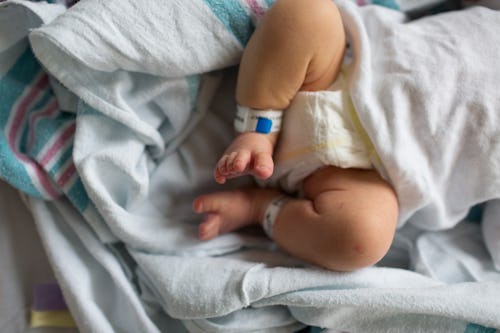
If you’ve been pregnant since the pandemic, it’s very likely your OB-GYN recommended being vaccinated for Covid-19. On September 26, the Centers for Disease Control and Prevention published new data reinforcing why. The CDC found that among infants 6 months and younger hospitalized for Covid, nearly 90% of their mothers were never vaccinated during pregnancy, leaving them more susceptible to severe infection.
Here’s what we know: Just like the flu shot, babies can’t receive their own Covid vaccine until they’re 6 months old. In order to protect them from serious illnesses in their first months of life, OB-GYNs recommend that parents receive the vaccine during pregnancy. When expectant parents are vaccinated, antibodies against the disease pass through the placenta, transferring protection to the fetus that last through the first few months of life.
What’s new in this report?
Between October 2022 and April 2024, 1,470 babies 6 months and younger were hospitalized with Covid-19. The authors of the study had detailed medical records for 1,148 of the infants. Those records revealed that 260 (roughly 22%) of them required intensive care, and nine died. Among the cases, researchers found that 1,065 of the infants’ records included their mother’s vaccination status from her pregnancy. About 88% of the hospitalized infants’ mothers had no record of being vaccinated during pregnancy, and all those who passed away were “born to mothers with no record of vaccination during pregnancy.”
Since Covid burst onto the scene, we’ve had a general understanding that the virus is harder on seniors and easier than you’d expect on children. But the CDC’s report found that the number of babies 6 months and younger hospitalized for Covid was a bit higher than hospitalizations for adults age 65 to 74. The authors of the report say the data concluded that young infants are vulnerable to severe complications from Covid-19, and that there is “an urgent need” to get more expectant parents vaccinated during pregnancy.
In what trimester should you get your COVID vaccine?
First things first: COVID vaccines have been proven to be safe for mothers and babies during pregnancy, and proven effective at reducing the risk of infection and severe illness. The American College of Obstetricians and Gynecologists recommends getting the vaccine at any time during pregnancy, but the sooner the better — this ensures you have a healthy pregnancy, and that baby is born with some protection from the vaccine too. It also seems that vaccines are becoming more effective at protecting mothers and newborns. The study notes that “the percentage of hospitalized infants whose mothers had been vaccinated during pregnancy was 18% from October 2022 to September 2023, and decreased to less than 5% during October 2023 to April 2024.”
Unlike some vaccines, there is no certain time or trimester when you have to receive the Covid shot. “The best time to get it is when it’s offered,” says Dr. Todd Wolynn, M.D., MMM, co-founder of Kids Plus Pediatrics and executive director of the Trusted Messenger Program for Public Good Projects, a public health education nonprofit. Because Covid doesn’t have a season and is just part of our world now, there’s no time like the present to protect yourself from it, he says.
It’s worth noting that of the infants in the study who spent time in the ICU, roughly 25% also tested positive for RSV, another vaccine-preventable respiratory illness. The CDC recommends that pregnant people receive a single dose of the maternal RSV vaccine between 32 and 36 weeks of pregnancy to protect newborns through their first RSV season.
Vaccine hesitancy is still a thing.
A 2023 survey found that only about a quarter of pregnant people say yes to being vaccinated against COVID. Of course, all pregnant people want what’s best for their baby, and Wolynn says there is a ton of medical disinformation circulated online to cast doubt on the vaccine’s safety. He says there’s also another force at work in those OB-GYN exam rooms called inaction bias.
“There are various biases we have as just human beings and one of them is called an inaction bias, which is, ‘I would never want to do something that could create harm. And if I don't do anything, I don't have to worry about the harm it might cause,’” he says. While declining the vaccine can feel like sidestepping harm in the moment, Wolynn cautions parents to remember that Covid is still “very much out there,” with a track record of causing serious illness in infants. Even those who don’t die or require hospital care can be left with “acute or long-term complications,” he says — meaning long Covid.
Long Covid is still poorly understood, particularly in young children who can’t describe things like fatigue or brain fog very well. Most studies estimate that between 10% and 20% of kids who catch Covid will suffer long-term symptoms that greatly impact their life, including generalized pain, shortness of breath, and heart palpitations, according to an explainer by Elisabeth Adkins Marnik, PhD.
Of course, Wolynn says, there is no way to detect if a baby is suffering in these ways. What we do know is that the only way to prevent long Covid is to prevent infection. One study found that even in children who did catch the virus, vaccines were 41% effective at reducing the diagnosis of long Covid. This CDC report is yet another in the growing stack of data showing how beneficial is it to be vaccinated for Covid in pregnancy.
If you’re pregnant and worried about making the best choice for you and your baby, Wolynn says to shut out all the noise online or from your social circles. Read recommendations made by trusted medical authorities on the topic at hand — in this case, the CDC and ACOG.
0 comments:
Post a Comment